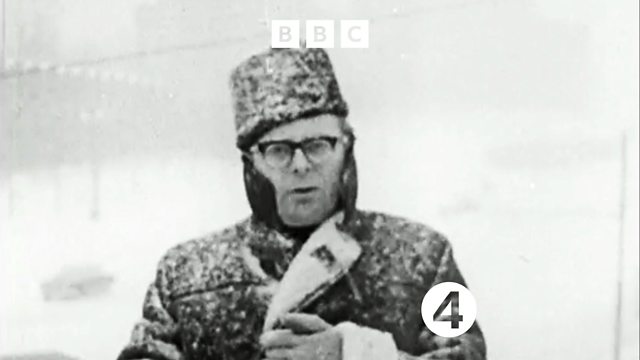Reporting Russia
Through wars hot and Cold, reform and repression, reporting Russia is always a tough journalistic assignment. A look back, with archive treasures and correspondents' memories.
Russia is a posting which requires foreign correspondents to inform their audiences about a vast country relatively rarely visited by tourists or other travellers, a land that for long periods of its history has been isolated from the West for political reasons. Often, their status and working conditions have been dependent on the state of international relations. They've lived under the threat of expulsion and even arrest. Apart from one short period of openness in the late 1980s and 1990s, it's almost always been hard to gain information and understand what's happening in the country. Now, since the start of Russia's full-scale war against Ukraine, many of the difficulties foreign reporters experienced in the Cold War have returned. One correspondent - Evan Gershkovich of the Wall Street Journal - is currently behind bars, accused of spying.
Tim Whewell, who was a Βι¶ΉΤΌΕΔ correspondent in Moscow at the time of Soviet leader Mikhail Gorbachev and his successor, Russian president Boris Yeltsin, has been looking through the Βι¶ΉΤΌΕΔ sound archives to trace the experiences of some of his predecessors - and successors - from the Second World War through to the present day. What were the pressures they've operated under? How did reporters in the Cold War dodge the constant surveillance of the KGB secret police? How did they find ways to meet ordinary people? And what - against all the odds - were their journalistic scoops? How did they cope with the increased physical danger that came with greater freedom in the 1990s? Did they always interpret the huge changes underway in the country correctly? And how do they continue to operate now in the repressive atmosphere of Putin's Russia? It's a roller-coaster of a story - with many funny moments along the way.
Contributors:
Kevin Connolly, former Βι¶ΉΤΌΕΔ Moscow correspondent
Mary Dejevsky, former Moscow correspondent for The Times
Angus Roxburgh, former Moscow correspondent for The Times and then the Βι¶ΉΤΌΕΔ
Martin Walker, former Moscow correspondent for The Guardian
Voices from the archives include:
Sarah Rainsford, current Βι¶ΉΤΌΕΔ Eastern Europe correspondent
Steve Rosenberg, current Βι¶ΉΤΌΕΔ Russia Editor
David Tutayev, writer and diplomat, occasional correspondent in Moscow in the 1940s
John Rettie, Reuters correspondent in Moscow in the 1950s
Erik de Mauny, the Βι¶ΉΤΌΕΔ's first permanent Moscow correspondent from 1963, and again in the 1970s
Richard Dimbleby, presenter and moderator of the Βι¶ΉΤΌΕΔ's General Election coverage in 1964
Philip Short, Βι¶ΉΤΌΕΔ Moscow correspondent during parts of the Cold War
Svevolod Ovchinnikov, Pravda correspondent in London in the 1970s
Petr Kumpa, Moscow correspondent for the Baltimore Sun in the 1970s
Kevin Ruane, Βι¶ΉΤΌΕΔ Moscow correspondent in the 1970s
Teresa McGonagle and Molly Lee of the Βι¶ΉΤΌΕΔ's Woman's Hour in the 1970s
Jack Dee, presenting Have I Got News For You on Βι¶ΉΤΌΕΔ TV in 2007 (produced by Hat Trick Productions)
Margaret, later Baroness Thatcher, Prime Minister of the United Kingdom from 1979-1990
Mikhail Gorbachev, last leader of the Soviet Union, serving from 1985-1991
Peter Snow, presenter of Newsnight from 1980-1997
Lawrence McDonnell, Βι¶ΉΤΌΕΔ correspondent in Moscow in the early 1990s
Danielle Gershkovich, sister of Evan Gershkovich, speaking to the Wall Street Journal in 2023
Producer: Arlene Gregorius
Editor: Tara McDermott
Production Coordinator: Maria Ogundele
Sound engineer: Mike Woolley
Photo: Erik de Mauney reporting in snowy Moscow, copyright Βι¶ΉΤΌΕΔ
Last on
More episodes
Previous
Broadcasts
- Sat 20 Jan 2024 20:00Βι¶ΉΤΌΕΔ Radio 4
- Fri 23 Feb 2024 21:00Βι¶ΉΤΌΕΔ Radio 4

